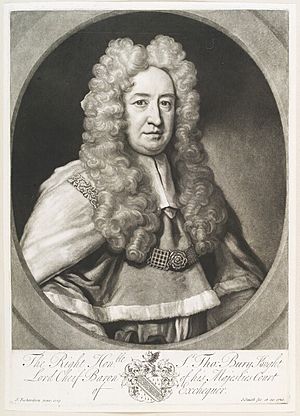Thomas Bury (judge) facts for kids
Thomas Bury (born in 1655, died in 1722) was an important English judge. He was involved in a big legal case about an election in Aylesbury in 1704. Later, King George I made him the Chief Baron of the Exchequer, which was a very high position in the legal system.
Contents
Early Life and Learning
Thomas Bury was born in 1655. He was the youngest son of Sir William Bury, a knight from Linwood, Lincolnshire. In February 1667, Thomas earned a bachelor's degree from Lincoln College, Oxford. The next year, he began studying law at Gray's Inn, a famous place for training lawyers.
His Career as a Judge
Thomas Bury became a lawyer, also known as being "called to the bar," in 1676. After practicing law for several years, he became a "serjeant-at-law" in 1700. This was a special rank for experienced lawyers.
On January 26, 1701, he was made a Baron of the Exchequer. This meant he became a judge in the Court of Exchequer, which handled financial cases for the King. He was also knighted that same year, which gave him the title "Sir." For fifteen years, he worked as a judge, doing his duties well.
The Aylesbury Election Case
In 1704, there was a big problem with the election in Aylesbury, Buckinghamshire. Some people used unfair methods to try and win. The Whigs, a political group, lost the election. They knew that complaining to the House of Commons would not help.
So, they decided to take the case to court instead. Some voters sued the people in charge of the election, called "returning officers." One of the most famous cases was called Ashby v. White. At first, the court sided with the returning officers, but the main judge, Lord Holt, disagreed.
The case then went to the House of Lords, which is the highest court in England. Judges were asked to give their opinions. Thomas Bury was one of these judges. He agreed with Lord Holt, saying that the voters had a right to sue. The House of Lords then changed the earlier decision, ruling in favor of the voters. This was an important case for protecting people's voting rights.
Later Life and Achievements
After the death of another judge, Sir Samuel Dodd, King George I promoted Thomas Bury. On June 10, 1716, he became the Chief Baron of the Exchequer. This was the highest judge in that court.
In 1718, he was chosen to be a Fellow of the Royal Society. This is a very old and respected group for scientists and important thinkers.
Thomas Bury died suddenly on May 4, 1722. He had been working as a judge just hours before his death. He was buried in the church in Grantham, Lincolnshire. He never married and did not have children. His land went to his grandnephew, William Bury. There is a painting of him from 1720.
 | Bessie Coleman |
 | Spann Watson |
 | Jill E. Brown |
 | Sherman W. White |


